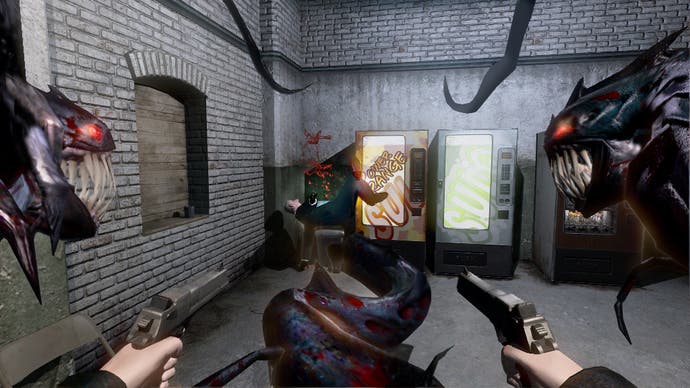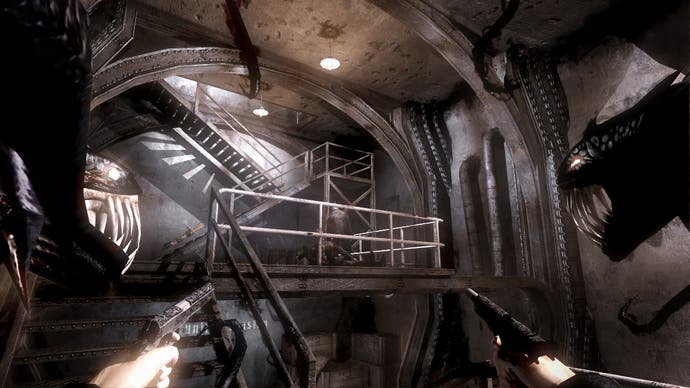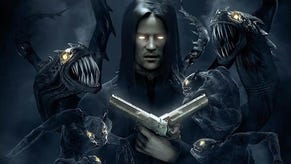The Darkness
Day of the tentacles.
Getting back to New York provides stark relief, and a clear illustration of how much more enjoyable it is to play the game in this setting. In this case, unlike Riddick, the change of scene doesn't necessarily work as well as you'd hope, and as good as it is to have a break from the norm, it seems more a tool to make the player feel unsettled and uncomfortable than anything. If that was the aim, job done, but it's simply not as enjoyable an experience for the player and doesn't exactly show off the best elements of either the technical prowess of the engine or the gameplay. It feels muddled and incoherent, like a bad dream you can't quite wake up from. Hurgh.
As masterful as some of the artistry and atmosphere is, there's still a lingering feeling that the game world and accompanying physics aren't as fleshed out as they might be, with an engine that doens't seem to have moved on an awful lot since Riddick astonished us in 2004. For example, being able to use the demon arm to wield objects and smash them down on assailants ought to kill them, not merely disrupt them: it's physics lite. And what about the ghost town streets of New York almost entirely free of NPCs, and with barely a single building you can enter? It's all very well making the locations staggeringly detailed, but if they end up feeling like flimsy film sets, what's the point? Looking back, it's a shame so much of the game's life, ambience and general interactivity is shoehorned into the two subway stations, because it serves to highlight what's missing elsewhere. It might remove the need to slowly wander around to meet up with characters, but it ends up feeling slightly unfinished as a result.
Other little kinks and quirks started to chip away at our original intention to dish out a back slapping 9/10. Control niggles when controlling the Creeping Dark mean that your tentacle tends to snag on dead bodies and refuse to crawl over them. You'll also grow to hate the way your tentacle will sluggishly misread your intended direction and often completely disorientate you in the process. For example - elementary changes of direction such as coming down a wall and back down to horizontal alignment rarely happen as quickly or as easily as you think they should, and during the heat of battle such things can be a real annoyance. Indeed, snapping your jaws in the direction of an assailant doesn't always make a firm connection - often bafflingly so. It's like Starbreeze never quite nailed what it was intending to do, and one of the most crucial elements of the game design doesn't end up feeling as fluid as it should. Shame.
And if we're going to get our slavering (albeit misbehaving) jaws stuck firmly into the weaker elements of The Darkness, perhaps now's the time to turn our attention to how the AI fares - obviously it's a key part of what any heralded shooter should offer in 2007. The truth is, although it's perfectly respectable and challenging enough to offer regularly exciting and engaging firefights, it doesn't really stand up to close scrutiny compared with the very best FPS AI out there, feeling a little standard and unambitious. Enemies tend to merely stand and shoot, taking cover and popping out to return fire in a typically obliging fashion - it's no FEAR, put it that way. You won't see any evidence of flanking tactics or concerted attempts at teamwork; in fact, I'd go as far as to say you won't see anything majorly out of the ordinary. Once in a while you might notice that some enemies follow you downstairs, but it's a rarity, and a valid complaint that The Darkness doesn't test skilled FPS players often enough. At its worst, the AI (on normal setting, at least) is downright dim if you're savvy enough to use creeping dark against them. They react so late, it stretches credibility - oh look, a giant tentacle slithering towards me. Oh noes! It may well have been a deliberate balancing decision to make it as accessible and entertaining as possible to the widest possible audience, but that doesn't hide the fact that the game's enemies aren't that smart, put it that way.

Another interesting point about the game as a whole, is that the most spectacular moments in the entire experience are saved for the very end when you're not even in control anymore. Seemingly Starbreeze wanted to take an opportunity to show you how it had all these plans to make a 10/10 action spectacular, but couldn't quite work out how to let the player do that within an intuitive control framework. The three minute section near the very final moments of the game, for instance, are so wild and frantic, it brings into sharp focus what the game could have been if they had cut the player loose. You have to see it to believe it.
Rob's contention that The Darkness offers "little that's new or hugely ambitious in its gameplay" is fair, to a large extent. You shoot guns. You have special powers. You kill people. They try to kill you back. Big deal - it was never going to be the most innovative game ever, but it's not something that should put people off if you're one of the millions of people that love shooters. No one would claim it's the first game to offer numerous contrasting types of 'weapons' either, nor is it the first to offer the player one than one approach to slaying their foe, but all you can ask for is that everything this is in the game is well balanced, relentlessly entertaining and works as it should - and it does.
The thing that really marks The Darkness out, we'll repeat, is its "minute-to-minute gameplay". You can't argue with that. It's a game which offers thrills arguably as intense as anything the genre has to offer. It is, for the most part, an extraordinarily entertaining game with precious little fat around the edges,and often technically stunning. Not only that, it's complemented by a wonderfully engaging script, great (although sometimes cod amusing in the case of Mike Patton's attempt at voicing The Darkness with gravely malevolence) voice acting, and some of the best presentation you'll ever see in a first-person shooter.
It's not often we'll talk about 'game direction' in the way that a film reviewer might refer to a must-see movie, but this deserves to be held up as a great example of a game that got it spot-on. More often than not, you get the sense that Starbreeze's main aim was to keep its audience entertained and that everything else simply flowed from that central idea. Admittedly, it's a shame that the otherworld sections were a blight on the overall quality, but it's not enough to detract from how you'll feel about it.

More likely, you'll remember the little touches. The hidden items, for example, provide you with an almighty amount of amusement in the form of warped answerphone greeting from a procession of mentally unhinged individuals, while the ability to sit down and watch entire movies (like Flash Gordon, The Street Fighter, various cartoons and music videos) is one of those moments you'll pull a friend in from another room to giddily exclaim: "look!" It's fairly meaningless in terms of the game, but simply fantastic that we've reached a stage where long-form, real-life movies can be chucked into a videogame as a bonus. Another nice touch is to get entire comics as an unlockable - especially useful if, like me, you've never read the graphic novel the game's based on.
Talking of bonuses, Starbreeze has also gone one further than it did with Riddick by including the online (or System Link) multiplayer portion to round off an already essential package. In this instance, you're given the usual Deathmatch, Team Deathmatch, and Capture the Flag staples, along with a Survivor mode where everyone's out to get you. Only eight players are supported, which is an initial disappointment for those of you used to somewhat bigger matches, but on the plus side you won't have to worry about waiting around incessantly in lobbies like you do with game with bigger player support. With all three modes you have the option to play as Humans, Darklings or as Shapeshifters (where you can switch between the two during play), so what seems like a standard online add-on is actually given something of an extra dimension.
To add to the fun, there are also 23 different characters to choose from - 15 humans and eight darklings, which is a nice touch. My favourite is Sally Kreuger, for presumably being related to Freddie. If she isn't, she should be. Given that very few people appear to be playing online as-yet (no wonder, given the game's not out for another four days), it's hard to discern quite how the game's online facet will go down in the big wide world, but the time we have had online suggests it's a worthy addition, if a little limited.
In a year absolutely crammed with interesting-looking first-person shooters, you've got to come up with a game of extraordinary quality to rise above the competition. The Darkness has come along at simultaneously the best- and worst-possible time: on the one hand, it has arrived before it risked being drowned out in a fiercely competitive market, full of games claiming to be the Next Big Thing; on the other, it might well suffer from people holding off for what else is coming out. For what it's worth, I'd concur with Rob and suggest that any fan of first-person shooters needs to play this game, even though the occasional duff level, and the slightly pedestrian AI disrupts the quality at times. Once The Darkness gets its tentacles around you, resistance is futile.









